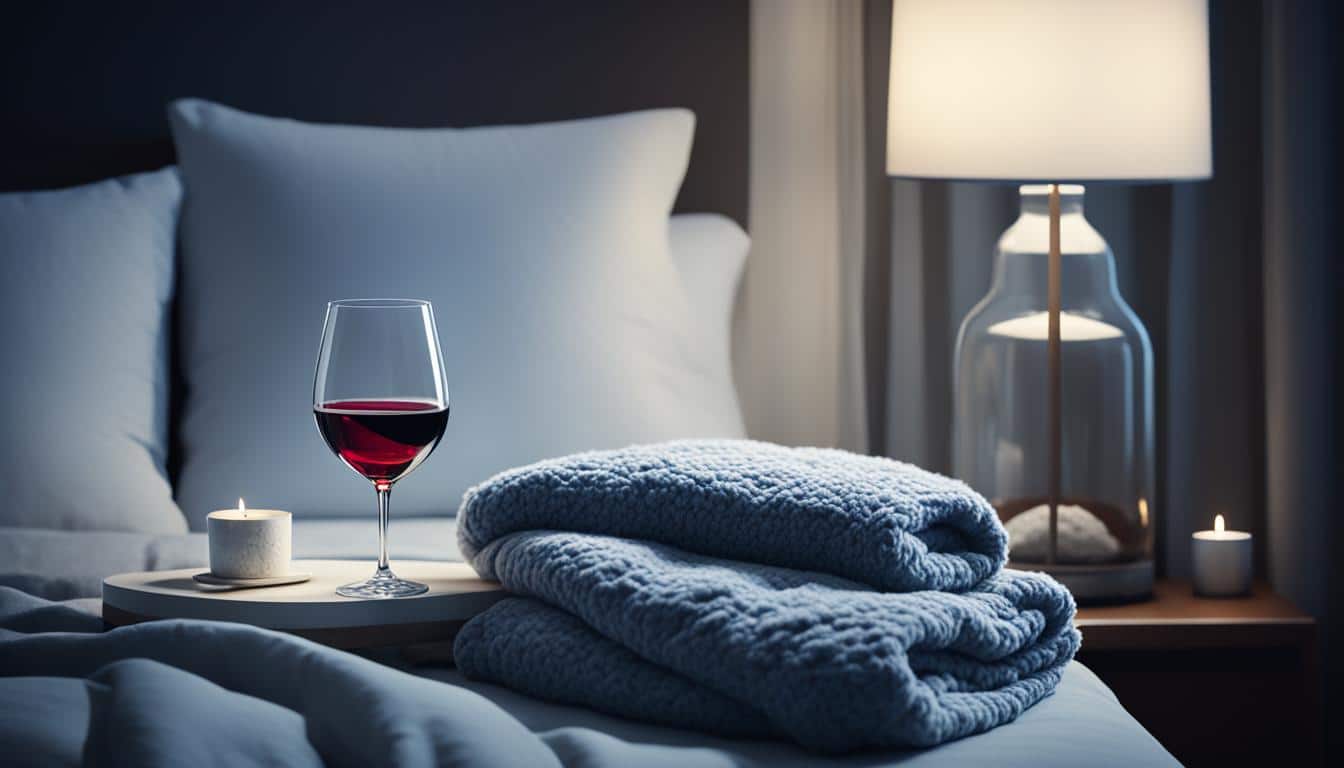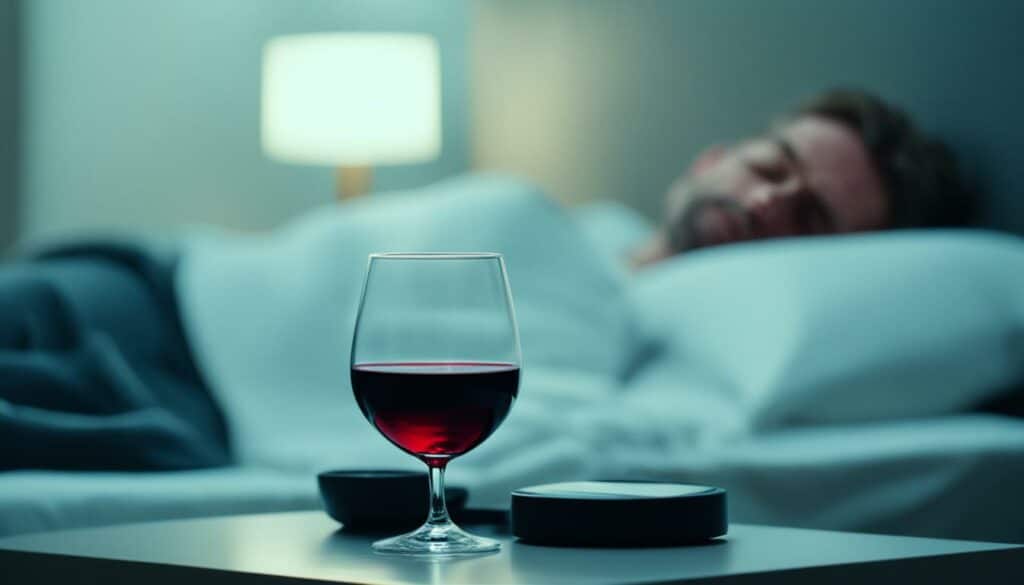Does Wine Help You Sleep at Night? Find Out!

Many people enjoy a glass of wine before bed to unwind and relax. However, the question remains: does wine actually help you sleep better? In this article, we delve into the relationship between wine consumption and sleep.
Key Takeaways
- Wine’s effects on sleep are still debated.
- Some individuals may find that a moderate amount of wine before bed helps them sleep better.
- Others may experience disruptions in their sleep after drinking wine.
- Understanding your body’s response to wine consumption is essential.
- It’s advisable to consult with a healthcare professional for personalized guidance if you have concerns about sleep quality or rely on wine regularly to fall asleep.
Red Wine and Sleep: Fact or Fiction?
Red wine has long been touted as a miracle drink that can help you relax and drift off to a peaceful sleep. But how much of this is based on science, and how much is just a myth?
While some studies have suggested that moderate red wine consumption can improve sleep quality, the evidence is inconclusive. The effects of red wine on sleep can vary depending on a number of factors, including age, gender, and overall health.
One potential benefit of red wine for sleep is its ability to increase levels of melatonin, a hormone that regulates sleep. However, research on this topic is limited, and more studies are needed to determine the exact mechanisms by which red wine may impact sleep.
On the other hand, some studies have suggested that red wine can actually disrupt sleep. Alcohol’s sedative effects can wear off after a few hours, causing you to wake up in the middle of the night. Additionally, drinking too much red wine can lead to dehydration, which can also impact sleep quality.
So, what’s the verdict? While red wine may help some people sleep better, it’s not a surefire solution for everyone. If you do choose to enjoy a glass of red wine before bedtime, it’s important to do so in moderation and listen to your body’s signals.
“While red wine may help some people sleep better, it’s not a surefire solution for everyone.”
Wine for Better Sleep: The Science Behind It
Many people turn to wine as a way to unwind and decompress before bed. But can this beloved beverage actually improve the quality of your sleep? Let’s dive into the science behind wine’s potential benefits when it comes to catching some shut-eye.
Firstly, wine contains compounds that could promote better sleep. For example, certain types of wine, such as pinot noir, contain higher levels of melatonin, a hormone that regulates sleep. Additionally, resveratrol, an antioxidant found in red wine, has been shown to improve sleep quality in animal studies.
However, it’s important to note that wine consumption can also have negative effects on sleep quality. While alcohol can help individuals fall asleep faster, it can also lead to more frequent disruptions during the night, reducing the overall quality of sleep. Additionally, drinking too much wine can even lead to insomnia, making it harder to fall asleep in the first place.
So, what’s the recommended amount of wine consumption for optimal sleep? Generally, it’s best to limit consumption to one glass of wine per night, preferably earlier in the evening to allow for enough time for the alcohol to fully leave your system before bedtime.
Overall, while wine could potentially improve sleep quality in moderation, it’s essential to listen to your own body and monitor your individual responses to wine consumption before bedtime. And, one last reminder, drinking wine before bed may have different effects on different people.
Debunking Myths: Wine’s Impact on Restful Sleep
While many people enjoy a glass of wine to relax and unwind before bed, there is often confusion about the impact of wine on sleep quality. Some believe that wine can enhance restful sleep, while others worry that consuming wine before bed can cause disruptions in sleep. Here, we will debunk common myths about wine’s effect on sleep.
The Effects of Wine on Sleep Quality
The relationship between wine consumption and sleep quality is complex, and there is no one-size-fits-all answer. Research indicates that small to moderate consumption of wine can improve sleep quality, while heavy drinking before bed can have negative effects.
| Positive Effects | Negative Effects | |
|---|---|---|
| Small to Moderate Consumption | May promote relaxation and improve sleep quality | N/A |
| Heavy Consumption | N/A | May cause sleep disruptions and lead to poor sleep quality |
When consumed in moderation, the compounds present in wine can have a sedative effect, which promotes relaxation and eases anxiety, ultimately resulting in better sleep quality. However, overconsumption can disrupt sleep patterns and lead to poor sleep quality.
The Importance of Moderation
Moderation is key when it comes to enjoying wine before bed. While small to moderate amounts of wine can be beneficial for sleep quality, overconsumption can have negative effects on sleep and overall health.
“Drinking wine in moderation can improve sleep quality, but overconsumption can lead to sleep disruptions.”
If you are looking to enjoy a glass of wine before bed, it is essential to understand your own body and its responses to alcohol consumption. By drinking in moderation and paying attention to your body’s signals, you can maximize the potential benefits of wine for sleep quality.

Conclusion
In conclusion, the relationship between wine consumption and sleep quality is a widely debated topic. While some individuals may experience a moderate amount of wine before bed to help them sleep better, others may experience disruptions in their sleep. It is important to listen to your body and understand the effects of wine consumption on your sleep quality.
If you have concerns about sleep or rely on wine regularly to fall asleep, it is advisable to consult with a healthcare professional for personalized guidance. While there may be potential benefits of wine for sleep, it is essential to practice moderation and understand the impact of alcohol on your body.
Overall, the effects of wine on sleep are complex and highly individualized. While it may provide some benefits for some individuals, it is not a one-size-fits-all solution for better sleep. As with any lifestyle change, it is essential to approach wine consumption with intention and awareness of your own body and its needs.
So, does wine help you sleep at night? It depends on various factors, and the answer may vary from person to person. Remember to enjoy your wine in moderation and always prioritize your sleep health.
FAQ
Does drinking wine before bedtime help you sleep better?
The effects of wine on sleep vary from person to person. While some individuals may find that a moderate amount of wine before bed helps them sleep better, others may experience disruptions in their sleep. It is important to understand your own body and its responses to wine consumption.
Is there any scientific evidence to support the notion that red wine can aid in sleep?
The belief that red wine can aid in sleep is not strongly supported by scientific evidence. While red wine contains certain compounds that may have sleep-enhancing properties, more research is needed to determine its actual impact on sleep quality and duration.
Are there any compounds present in wine that could promote better sleep?
Wine contains compounds such as melatonin and resveratrol, which have been associated with improved sleep. However, the amount of these compounds in wine is relatively small, and their effectiveness in promoting better sleep is still debated among experts.
Can wine consumption have negative effects on restful sleep?
Excessive wine consumption or drinking wine too close to bedtime can have negative effects on sleep quality. Alcohol is a known disruptor of REM sleep, which is crucial for restorative rest. It is important to consume wine in moderation and avoid relying on it as a sleep aid.
What should I do if I have concerns about my sleep quality or rely on wine regularly to fall asleep?
If you have concerns about your sleep quality or find yourself relying on wine regularly to fall asleep, it is advisable to consult with a healthcare professional. They can provide personalized guidance and help address any underlying sleep issues you may be experiencing.